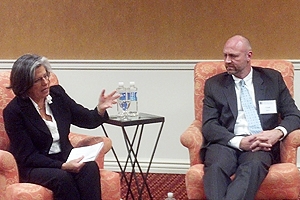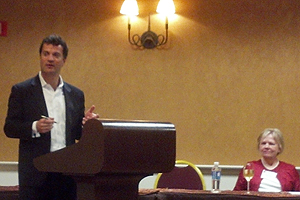Research
Panel: Communication, infrastructure investment key to securing water future

Susan Leal, Senior Vice President, Chief Strategy Officer, Water at AECOM and Chad Spitler, Managing Director, Corporate Governance & Responsible Investment, BlackRock
The Center for Environmental Policy recently hosted “The Future of Water” – a forum exploring water resource issues in California and across the United States. Held in San Francisco on November 7th, the forum’s panel featured William K. Reilly, one of the nation’s most respected environmental leaders, and remarks from Jared Blumenfeld, Region 9 Administrator for the Environmental Protection Agency. The event was the first in a series of dialogue sessions on “The Future of Water,” sponsored by the Center for Environmental Policy and under the auspices of the new William K. Reilly Fund for Environmental Governance and Leadership.*
School of Public Affairs alumna Kathleen Shaver, Sustainability Officer at Cisco Systems moderated the panel which, in addition to Reilly, included Susan Leal, Senior Vice President, Chief Strategy Officer, Water at AECOM and Chad Spitler, Managing Director, Corporate Governance & Responsible Investment, BlackRock. The program included remarks by Dan Fiorino, Director of the Center for Environmental Policy, who highlighted the emerging challenges and opportunities at the federal level.
In his opening comments, Jared Blumenfeld emphasized the extraordinary challenges – both to the environment and the economy – posed by water resources issues in California and across the country. He stressed the need to educate the public about direct potable water reuse as one critical measure to reduce water consumption in the United States. Current studies estimate that over 400 gallons of water is consumed daily per family, a rising level that is placing greater and greater strain on national water resources. Blumenfeld pointed to Fresno, California – “the Silicon Valley of water efficiency technology” – as a role model for innovation in water resource management.

Jared Blumenfeld, left, speaks during the forum as SPA Dean Barbara Romzek listens.

William K. Reilly, far right, listens during a session with Susan Leal and Chad Spitler.
Innovation and investment were addressed throughout the panel discussion. According to Reilly, the last major federal investment in water infrastructure was in the late 70’s and early 80’s following the enactment of the Safe Drinking Water Act during the Nixon administration. Susan Leal, formerly of the San Francisco Public Utility Commission, also affirmed the historic lack of investment by the federal government which, until recently, has caused public utilities to keep prices low and wait for the federal government to step in and fund water infrastructure upgrades. With no sign of an influx of federal funds, Leal shared that public utilities are finally beginning to make major upgrades to their systems either as a result of consent decrees from the EPA for violating federal clean water or safe drinking water laws, or out of fear of that aging infrastructure will fail.
Chad Spitler of BlackRock highlighted the role that investors can play in promoting corporate best practices with regard to water management and conservation. He discussed that in evaluating a company’s risk potential, a growing number of investors are assessing the corporate executives’ handling of natural resources and other critical environmental issues. In addition, Spitler emphasized the critical role that government regulations can play in inspiring change – both with organizational practices and individual behavior.
Leal pointed out that the next frontier of innovation in water resource management will come through the agricultural sector and food consumption. She provided a startling example of the enormous water resources – 692 gallons - required to bring just one six-ounce hamburger patty from farm to table. Leal’s example emphasized that, in order for real change in water consumption to take place, both individuals and communities must have a far greater appreciation for their "water footprint."
Concerns about the low cost of water providing a disincentive for innovation were issues discussed at length in the session. Reilly accentuated the need to move quickly to promote innovation in water resource management, in particular given the Intergovernmental Panel and Climate Change study’s prediction of an impending crisis in regular severe droughts west of the Mississippi. In addition, increasingly quicker snow melts are rapidly accelerating the need to invest in water storage and conservation and efficiency improvements. In exploring ways to encourage behavioral change and spur innovation, a central discussion theme revolved around the inevitable rise in the price of water – especially for individual consumers. The financial cost of water – relatively light today – has the potential to rise rapidly in the years ahead. These increased costs may prove to be a highly motivating factor in curbing water consumption across the county. Spitler also added that one way to more proactively force change is through the fledgling green bonds market. Offered by the World Bank and other supernational organizations, these bonds raise debt financing for projects with environmental benefits such as reducing greenhouse gas emissions. These bonds have been very attractive to institutional investors and insurance companies and are a growing sector.
* The William K. Reilly Fund for Environmental Governance and Leadership, established at American University in 2013, recognizes the substantial contributions that Reilly has made to U.S. environmental and energy policy. The Reilly Fund directly supports two annual environmental leadership awards; a student scholarship program; and forums, such as “The Future of Water,” that contribute to dialogue and debate on critical environmental policy issues.
